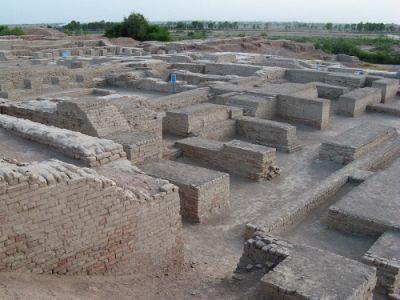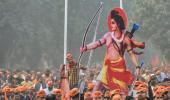'They were certainly not practising Hinduism in the Harappan culture (which includes Mohenjo Daro and other sites).'
'There was no notion of Hinduism then.'

If you want to understand Indian history at one go, then A New History of India is surely for you.
Written by Rudrangshu Mukherjee, Shobita Punja and Toby Sinclair, A New History of India goes into fascinating details about the geological formation of our country and also delves into history, thus making it a must read.
Mukherjee has taught history at the University of Calcutta and held visiting appointments at Princeton University, the University of Manchester and the University of California, Santa Cruz.
He is internationally acclaimed as a historian on the First War of Independence in 1857 and his first book Awadh in Revolt, 1857-58: A Study of Popular Resistance (1984) is considered the standard reference book on the subject.
He has looked at the 1857 rebellion in four other books: Spectre of Violence: The 1857 Kanpur Massacres (1998), Mangal Pandey: Brave Martyr or Accidental Hero? (2005), Dateline 1857: Revolt against the Raj (2008) and The Year of Blood: Essays on 1857 (2014).
He has also authored and edited several books on other themes, including The Penguin Gandhi Reader (1993), Politics and Trade in the Indian Ocean World: Essays in Honour of Ashin Das Gupta (1999), Remembered Childhood: Essays in Honour of Andre Beteille (2010), New Delhi: The Making of a Capital (2009), Great Speeches of Modern India (2011), Nehru And Bose: Parallel Lives (2014), Twilight Falls on Liberalism (2018) and Oxford India Short Introduction: Jawaharlal Nehru (2018).
"We have very little knowledge of how pre-Vedic society was organised," Rudrangshu Mukherjee tells Syed Firdaus Ashraf/Rediff.com.
Many people consider history a boring subject, but in this book you make it interesting by bringing in the geographical formation of India as a country.
Why did you feel it would be compelling for readers to know the details right from Gondwanaland to the present geographical formation of the land mass we call India?
We do not try to make it interesting by only bringing the geological formation of India. We use photographs with detailed annotations to make the book more attractive and unusual.
Can we say the first batch of men to arrive in India was from present day Yemen and that was 70,000 years ago?
Yes, that is what the evidence suggests, around 65,000 years ago as we say in the book.
Can we say Bhimbetka in Madhya Pradesh was the place where the first Indians lived? Which year was this and from where did these people come from?
No, we cannot say that Bhimbetka shows evidence of human habitation going back 10,000 years.
Were the Harappan culture which began in 3000 BC or for that matter Mohenjadaro practising Hindu religion as it is practised today? The only mention in your book is that of a seal which is a representation of a proto Shiva, and that too is uncertain.
No, they were certainly not practising Hinduism in the Harappan culture (which includes Mohenjo Daro and other sites). There was no notion of Hinduism then.
Another interesting fact that comes out in your book is that the Harappan cities did not exhibit ostentatious display of wealth in the houses or in the graves. Did gold or silver or any such commodity have any value?
We have no evidence of their value.
Did the Aryans come out of India? You specifically mention that Aryans should be correctly referred to as Indo-European speaking people and one must not categorise them in a racial context. Why so?
No, they did not come from India. The relevant part of the book explains very clearly why Aryan is not a racial category.
You state that the Vedas were written around 1200-600 BC; does it mean the Hindu religion is not older than 3,200 years, or was there a Hinduism before the Vedas?
The Vedas do not refer to anything called Hinduism.
What is the similarity or difference between the Avesta text and the Rig Veda text that the Aryans wrote? The only thing we know is that Persians own the Avesta and Indians got the Rig Veda -- but who wrote these scriptures?
People speaking variants of Indo-European languages composed these texts, they were not written texts.
How did the caste system originate in India? Did the Aryans introduce it? And was learning orally a tradition started by Aryans?
It is difficult to say how the caste system originated. Yes, all of Vedic learning was oral.
If Aryans constructed a new social hierarchical order marked by caste-based division, then what was the earlier Indian society structure like? How was the division of labour done?
Division of labour was through occupations, we have very little knowledge of how pre-Vedic society was organised.
If Brahmins alone spoke Sanskrit and the masses spoke Prakrit, why and when did Brahmins give up Sanskrit in such numbers that it became a dead language?
Brahmin priests never gave up Sanskrit; it became a language for rituals.
Can we say Chandragupta Maurya was the first king of India? If yes, who ruled India before 324 BCE? Was the village system the only way of life? What was the currency? What did people value the most in those times?
Chandragupta Maurya ruled over large tracts of North India (and) to call him the first king of India would be an exaggeration.
Before the Mauryas, clan-based dynasties ruled over different parts of India. There is evidence of urban settlements. Coins were used in Mauryan times.

How did Hinduism gain supremacy over Buddhism and Jainism? Which year, and who was instrumental in it?
It is not possible to be precise about dates and individuals regarding this phenomenon. It was a long drawn out process.
Megasthenes made no mention of untouchability in the Mauryan empire, so how did this system creep in and when?
Just because Megasthenes did not speak about untouchability, it does not mean that there was no untouchability.
Why did Hindu kingdoms start losing to invaders from Afghanistan? What military tactical advantage did the Afghans have over Indian rulers that led to their defeat?
The extensive use of cavalry was a factor.
What effect did the conquest by Islamic invaders have on the psyche of Hindu subjects? And how difficult or different did life become for them under the new Muslim rulers?
Historians have very little evidence on psyche. The impact of Islam is discussed in the book.
How did Alauddin Khilji keep prices of essential commodities low and why did Ibn-e-Batuta, who came to Delhi 17 years after Khilji's death, say his rule was some kind of golden age? Was Khilji not someone who is perceived to be anti-Hindu?
There is no such perception about Allauddin.

What about conversions? How actively did Muslim rule convert Hindus? And why did a large part of Bengal convert to Islam while other parts of India did not?
These issues are extensively discussed in the book.
Why did the influence of Islam not see India becoming a Muslim country? What factors prevented it? Persia, for instance, became a Muslim country while Indians held on to Hinduism strongly in spite of 600 years of Muslim rule.
The whole of India was not under Muslim rule for 600 years.
When Indian National Army soldiers were being punished in 1946, Hindus and Muslims came on the roads to protest against the British. How did relations between the two communities deteriorate in one year that India had to witness Partition?
Because of the campaign of the Muslim League.
Jawaharlal Nehru dreamt of India belonging to all irrespective of their religious beliefs, but now we see intolerance towards minorities as the main discourse of politics.
Is Mohammed Ali Jinnah, who said Muslims remaining in India will be at the mercy of Hindus, proving right?
I hope Jinnah is not proved right.
On March 8, 2023, Professor Rudrangshu Mukherjee and Shobita Punja discussed their book A New History of India with readers at Mumbai's beloved book store, Kitab Khana.
Rediff.com's Satish Bodas and Afsar Dayatar capture glimpses from the session.
Rudrangshu Mukherjee adds that the book is a testament to their friendship. All videos: Afsar Dayatar/rediff.com








